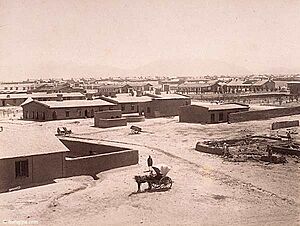History of Quetta facts for kids
Quetta is a very important city in Pakistan. It's like a natural fort because it's surrounded by tall hills on all sides. These hills include Chiltan, Takatoo, Mordar, and Zarghun. The name "Quetta" comes from the Pashto word kwatta, which means "fort" or "castle."
People believe that the first Muslim rulers of Quetta were from the Pashtun Kasi Tribe. Quetta was first mentioned in history about 1,000 years ago. This was when Mahmood of Ghazni captured it during one of his trips to the subcontinent. Later, in 1543, the Mughal emperor Humayun rested here on his way to Persia. He even left his one-year-old son, Akbar, here until he returned two years later.
For a long time, Quetta was a battleground between the Afghans and the Baloch people. In 1751, Ahmed Shah Durrani gave Quetta to the Khan of Kalat, Mir Noori Naseer Khan Baloch. This was a thank you for his help in battles against the Marathas and the Sikhs. Today, Quetta has many Pashtun people, especially from the Kasi and Kakar tribes.
History of Quetta
The story of Quetta goes back a very long time. The oldest signs of people living here are from the Stone Age. These were hunting camps with simple stone tools. The first settled villages in this area appeared around 7,000 to 6,000 BCE. One important early village was Mehrgarh.
Over time, these villages grew bigger. People started trading goods and materials like shells, lapis lazuli (a blue stone), and turquoise. By 2500 BCE, the region around Quetta was connected to the Indus Valley Civilization. It provided important resources to the large cities along the Indus River.
Powerful rulers called the Khans of Kalat controlled the fort from 1512. In 1828, the first Westerner to visit Quetta described it as a mud-walled fort with about 300 mud houses around it. The British briefly took control during the First Anglo-Afghan War in 1839. However, it wasn't until 1876 that Quetta fully came under British rule. Robert Groves Sandeman became the political agent in Balochistan.
When the Muslim League political party was formed, people in Balochistan also worked for Pakistan's freedom. Qazi Muhammad Essa was a key person who introduced the Muslim political party in Balochistan. This effort continued until 1947. After Pakistan became independent, Balochistan joined the new country, and Quetta became its capital city.
The name Quetta comes from a Pashto word, kwa ta, which means "inside the mountains" or "among the mountains." Long ago, around 660 CE, during the time of the fourth caliph Ali ibn Abi Talib, the area of Quetta was known as Al-Qiqan.
See also
- 1935 Quetta earthquake
- 2008 Ziarat earthquake
- Bangulzai
- Bozdar
- Brahui people
- Bugti
- BUITEMS
- Pakistan Command and Staff College
- Dawi
- Ghilji
- Kakar
- Kasi (Pashtun tribe)
- Lango tribe
- Marri
- Mengal
- Pashtuns
- Quetta attack (disambiguation)
- University of Balochistan
 | Ernest Everett Just |
 | Mary Jackson |
 | Emmett Chappelle |
 | Marie Maynard Daly |



